Mexico

EARLY IN THE musical Saturday Church, the endearing teenage protagonist Ulysses prays to God. His father has died, his mother is always working, and his church community keeps pushing him to be less effeminate. “I’m in here, a prisoner of all my thoughts,” Ulysses sings. “Can anybody help?”
Onto the stage—wearing a long wig, a shimmering dress, and knee-length boots—steps “Black Jesus.” “Are there any queens in the house?” they sing to the room, before proceeding to do a dance number in the style of queer Black and Latino ball culture. “I come in many forms,” they tell Ulysses. “But this is my favorite.”
Black Jesus is one of several biblically inspired characters and events to have recently debuted in new musicals in New York. And while their plots vary widely, each has mined the Bible in ways that offer fresh resources for the Christian imagination.

IT'S A GRAY, mid-May morning in Panteón Municipal #1, a city cemetery in Tijuana’s Zona Norte neighborhood. Alberto, the gatekeeper, saunters down a rocky pathway lined with palms, jacaranda, and gravestones to a prominent, red brick chapel, built over the tomb of one Juan Castillo Morales.
The shrine is covered wall-to-wall with candles, flowers, and plaques with names and messages of thanks to “Juan Soldado” (Juan the Soldier), as Castillo is known. Amid the array sits a stylized bust of a young soldier, resplendent in military attire, this morning bearing a black rosary and a blue-and-white Los Angeles Dodgers snapback hat.
The shrine is one of many unofficial memorials where loved ones remember lives of immigrants lost along the U.S.-Mexico border. From chapels erected around the graves of unofficial saints such as Castillo to digital memorials people carry with them into the desert to the crosses, flowers, and other mementos left along the border boundary itself, these monuments not only pay tribute to the individuals lost but bear witness to the ubiquity of death — and faith — in America’s southwestern borderlands.
Rosalba Ruiz-Hernández, a 46-year-old mother of five, stands in the shrine. Ruiz-Hernández, originally from the southern Mexican state of Oaxaca, was deported back to Tijuana after her own failed attempt to start a new life in the U.S. Two of her grown children still live in Long Beach, Calif., near her former husband. They are undocumented, she said, but they make a living. Two others are in Tijuana with her. Matías, her middle son, died in the desert on his way north to join his siblings in Southern California.
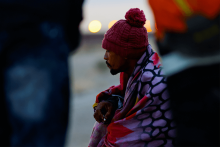
I am not sure what else needs to happen so the entire U.S. church wakes up to the realities of the evils entrenched in our immigration system. Honoring the dignity of all people is our calling as Christians; no other entity is tasked with recognizing the image of God in every person. Our Latine brothers and sisters are leading the way, but the whole church should be outraged; we should be demonstrating without ceasing. We should not let people sleep until they see the humanity of every migrant.
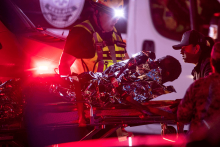
At least 39 migrants from Central and South America died after a fire broke out late on Monday at a migrant holding center in the Mexican northern border city of Ciudad Juarez, apparently caused by a protest over deportations, officials said on Tuesday.
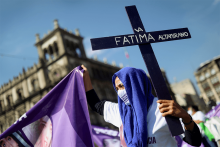
Holding aloft crosses bearing the names of murdered women, hundreds of people marched in Mexico’s capital on Wednesday to protest violence against women amidst a steady nationwide increase in femicides.
Chanting “we are your voice,” organizers used megaphones to read out the names of murdered women in downtown Mexico City.
The “Day of Dead Women” march took place a day after Mexico’s national holiday Day of the Dead. About 500 people took part in the protest, according to a Reuters witness.
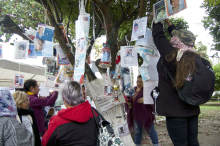
“My name is Maria Herrera,” she told the congregation, “and I have four disappeared sons.” She went on to plead for their solidarity: for anyone with information about where the brigade might find clandestine graves to speak out. The brigade, Maria emphasized, doesn’t look for guilty parties. They don’t care about finding out who took their loved ones. They just look for their family members, dead or alive.
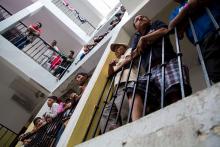
Migrant people hold the now and the not yet in tension. In the midst of waiting to make it up north and taking their turn for a credible fear interview at the border, life continues. People find ways to feel alive, to keep hope alive. At La Casa del Peregrino, holding on to hope looked like doing karaoke, coloring banners, and making beaded bracelets. They were not devoid of life.

The first cast in the ochre light of the dawning sun is a morning prayer, filled with hope and faith that ceremonies sought in earnest will feed the soul. I reel dutifully, waiting for a faint tap on the end of my line. My father stands at the front of the boat, scanning for ripples on the water in the low light. “Wachale!” he exclaims in joking Spanglish as he reels in the first largemouth of the day. Two Mexican-Americans bass fishing in Texas. This is the face of the Reconquista.
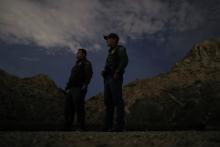
All data indicate that undocumented migration from Mexico, in particular, has ended and at this point more unauthorized Mexicans are leaving the country than entering it. According to estimates from the Pew Hispanic Center, the Center for Migration Studies and the Department of Homeland Security, the undocumented Mexican population stopped growing in 2008 and has been trending downward ever since.

But back to the wall idea, which President Trump said could easily be built by the Army Corps of Engineers, because they’re, you know, in the army right? He assured skeptical Pentagon officials that the $20 billion would be more like a loan, because, duh, Mexico would pay it back. In fact, U.S. negotiators are already working with their Mexican counterparts to establish the precise terms of repayment. Asked if he prefers reimbursing the American treasury with a lump sum or in monthly payments, Mexican president Enrique Peña Nieto replied, pleasantly, “How about nada? Does nada work for you?”
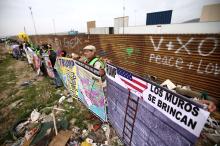
President Trump, I personally invite you to also come down to the borderlands with me in Tijuana and San Diego and meet the people directly impacted by the stroke of your pen. I am a co-founding director of Global Immersion, and one of our primary organizational initiatives involves having cross-sector leaders from around the country come to the border to see the human face of immigration and build a set of tools for how to better care of the “stranger among us,” as my sacred text (the Bible) mandates.

Dancing devils, towering skeletons, and altars festooned with marigolds made their way down Mexico City's main thoroughfare on Saturday to commemorate Day of the Dead in a country still mourning nearly 500 people killed in earthquakes last month.

Desperate rescue workers scrabbled through rubble in a floodlit search on Wednesday for dozens of children feared buried beneath a Mexico City school, one of hundreds of buildings wrecked by the country's most lethal earthquake in a generation.

Pastor Craig Paschal says the decision to turn his church into a sanctuary, and a focal point in the nationwide immigration debate, was not easy but he considered it a Christian duty.
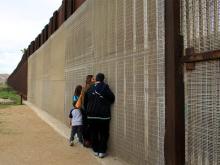
President Trump’s proposed border wall with Mexico raises serious questions about America’s moral standing, as the poor would bear the brunt of the suffering, a leading Catholic theologian says.
The Rev. Daniel G. Groody, an associate professor of theology at Notre Dame University in Indiana, said the wall would lead to a loss of life, as migrants are forced to find other ways to escape poverty across the border.
“What Trump fails to see is that state sovereignty is not an absolute privilege, but a moral responsibility,” said Groody.

President Donald Trump vowed to make good on a campaign promise to repeal the law that restricts political speech from the pulpit, speaking at his first National Prayer Breakfast as president.
“I will get rid of, totally destroy, the Johnson Amendment, and allow representatives of faith to speak freely and without fear,” he said on Feb. 2 to a gathering of 3,500 faith leaders, politicians, and other dignitaries from around the world, including King Abdullah of Jordan.
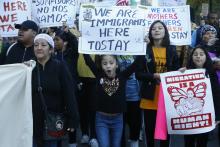
One action blocks federal funding for sanctuary cities, something in which many churches and communities of faith participate. An estimated 400 congregations nationwide support sanctuary or are actively opening their doors to immigrants.

On Nov. 14 the U.S. Conference of Catholic Bishops asked President-elect Donald Trump to implement policies geared toward honoring the humanity of immigrants and refugees, reports the Associated Press. The Roman Catholic bishops made their call to President-elect Trump at the beginning of their annual meeting in Baltimore.
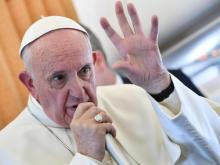
In an interview conducted on Nov. 7, on the eve of the election, and published Friday by an Italian daily, the Argentine pope declined to make any judgment about Trump.
“I do not judge people or politicians,” the pope told Eugenio Scalfari of La Repubblica when asked what he thought of Trump. “I only want to understand what suffering their behavior causes to the poor and the excluded.”

The bullet-ridden body of the Rev. Jose Lopez Guillen was found Sept. 24 on the highway outside Puruandiro in the western state of Michoacan, [Mexico], a region plagued by violent conflict. The 43-year-old cleric had been abducted from his home in nearby Janamuato five days earlier.
“He was an engaging personality,” said Maria Solorio, a regular at Lopez’s church. “He was an excellent priest and very devoted to the community. … What happened to him was a great injustice.”